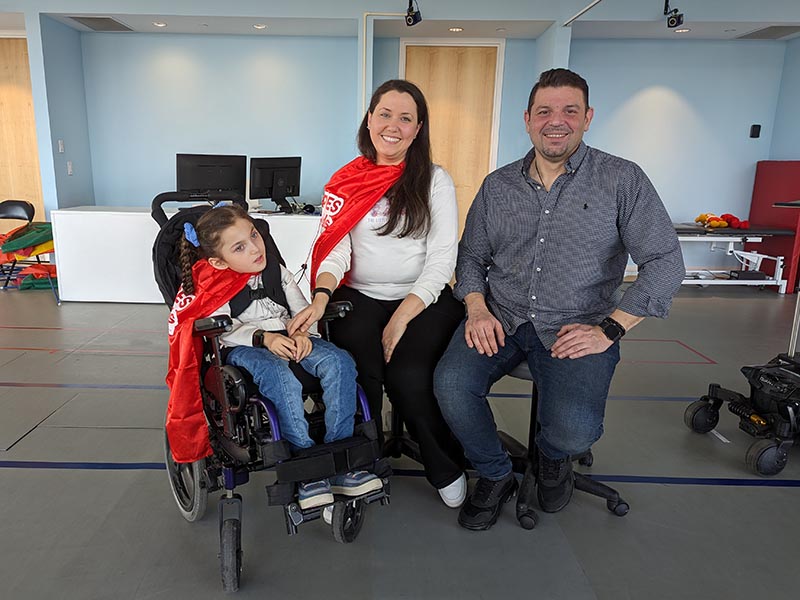
Giselle’s story

Giselle’s story

Nine-year-old Giselle is always so happy when she comes to Holland Bloorview’s Clinical Brain Computer Interface out-patient program. With the help of clinical staff and researchers, she can do all sorts of fun things like drive her wheelchair or play games – all with just her mind.
Giselle has a global developmental delay caused by a rare gene mutation. This mutation affects her brain’s ability to communicate with her muscles. As a result, Giselle doesn’t speak and doesn’t have a lot of movement she can control. Brain computer interfaces (BCIs) rely on brain signals to control things like remote control cars, video games and switch toys. Giselle can use BCI to play without needing any kind of physical movement.
Since its inception in 2019, the clinical BCI program has reached over 160 children and youth with disabilities. Holland Bloorview is the first pediatric hospital in the world to use this technology in a clinical setting to enable participation and engagement in pediatric rehabilitation.
This recreation-focused program helps kids with limited speech and movement play using this innovative technology. They can engage in different activities such as remote control car racing, painting, learning how to code, watering a garden and moving their wheelchair by using brain computer interface technology that converts their thoughts into commands. The clinic also recently piloted BCI programming in two Ontario schools and has lent the technology to over 20 families to use at home.
The clinic, led by Susannah Van Damme, works in close partnership with the Bloorview Research Institute’s Paediatric Rehabilitation Intelligent Systems Multidisciplinary (PRISM) Lab, to customize programming to meet each participant’s unique needs.
Dr. Tom Chau, a distinguished senior scientist and head of the PRISM Lab, has been leading the research in pediatric BCIs over the past two decades and is one of the top scientists in the field worldwide. His team developed Mindset, a unique software program that enables different BCI headsets to interact with a variety of external activities. Without this software, the clinic could not offer any BCI programming. The PRISM team is also researching how BCI can be combined with eye movements and other facial movements to support more natural interactions with the environment. They are also developing a dashboard for clinicians and participants to receive instant feedback on how the participant is interacting with the technology to complete a task.
Holland Bloorview, together with Glenrose Rehabilitation Hospital in Edmonton and Alberta Children’s Hospital in Calgary have been leaders in bringing BCI technology to kids and youth with disabilities.
Q & A with Nasar and Samah, Giselle’s parents
How would you describe Giselle?
Giselle loves music and reading. She’s also very social and enjoys engaging with other people, whether it’s kids or adults. Holland Bloorview has been like a second home for her – seeing all the kids and getting involved in all the activities. We used to get an adapted tricycle for her on loan and she loved it so much we ended up buying her one. A lot of things that are happening within Holland Bloorview are helping Giselle to develop.
What are you most excited about BCI for your daughter?
For the most part, Giselle is fully dependent on us as parents. She relies on us for feeding and communication among other daily functions. She does use eye-gaze technology to control a cursor on a computer but it doesn’t always work.
That’s why we’re so excited about BCI. It’s perfect for children like Giselle who can use the power of their thoughts alone to make things happen. This technology works directly with the user’s thoughts, which is very appealing for us.
It was an eye-opener to see she was using her thoughts to do something. It was very emotional for us. She was also super excited to see her thoughts translated into action. You can see it in her eyes.
What kind of difference could this technology have in Giselle’s life?
Right now, Giselle is fully dependent on us when it comes to communication. If she wants to tell us she’s thirsty or wants to take a nap, she needs help to communicate that message.
We see so much potential with BCI technology to enable Giselle to function more independently. This technology will open doors for her in the future – whether it’s getting a job or being part of her community.
We want to ensure that she has a productive and independent future.
